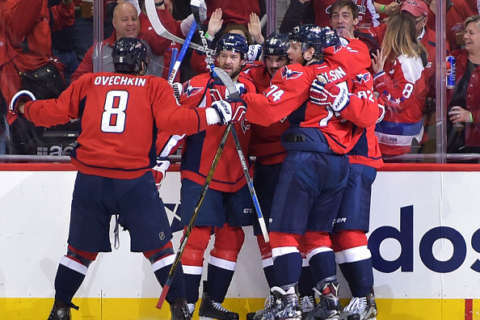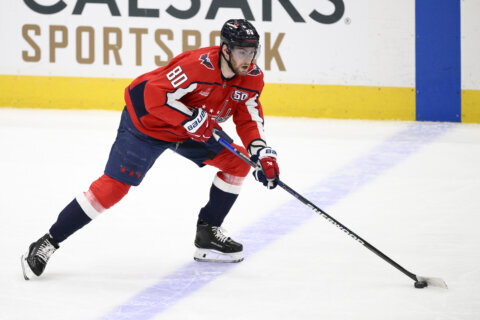Capitals hope to generate more traffic in front of the net originally appeared on NBC Sports Washington
Since the calendar turned to 2022, it has been a grind for the Capitals. Washington is just 1-3-2 in the New Year and the team is struggling in unexpected ways. One issue is the team traditionally known for its offensive firepower is suddenly struggling to put pucks into the net. That was evident in Sunday’s loss to the Vancouver Canucks as the Caps scored only twice in a 4-2 loss.
For the season, Washington ranks 10th in the league with 3.26 goals per game. Heading into 2022, however, the team was scoring at a clip of 3.45 goals per game. It is a small sample size, but in the six games the team has played in 2022, that average is down to 2.17. The Caps have been held to two goals or fewer in four of those six games.
“We’ve had looks the last two nights 5-on-5, we haven’t done a good job at capitalizing on them,” head coach Peter Laviolette said.
There are some obvious reasons for why the offense is struggling. First, the team was without several key contributors on Sunday. T.J. Oshie was out after leaving Saturday’s game in the first period. He has been limited to just 18 games this season. Nicklas Backstrom is still finding his way as Sunday was just his sixth game of the season. Anthony Mantha remains out after shoulder surgery. Conor Sheary, who ranks second on the team in even strength goals, and John Carlson also did not play as they are both in the league’s COVID-19 protocol.
In addition, the power play has really struggled, but that was not the issue on Sunday as the team scored both of its goals on the man advantage. The team had a different issue on Sunday. Vancouver goalie Thatcher Demko was outstanding in net, but the Caps made life easy for him by allowing him to see just about everything that came at him.
“I think first half the game we didn’t go to the front of the net, especially when we move the puck to our blue line, we just stay perimeter and you can see, every shot he sees it,” Alex Ovechkin said. “In this league, it is hard to score from the blue line if no traffic and nobody in front. How I said, we are going to watch the video, make some adjustments and move on.”
Generating more traffic in front of the net became a priority as the game went on, but to no avail.
“There’s no question that traffic makes it more difficult,” Laviolette said. “Traffic makes everything a little bit harder for a goalie to manage so you get one body in there, two bodies in there, now you bring in two defenders, now there’s opportunities for tips, there’s opportunities for rebounds, there’s opportunities for screens. Could have had more opportunities had we brought more people to the net.”
The lack of traffic is a reflection of the mounting frustration the team is feeling offensively. When a team feels that frustration, they press and the fundamentals, such as generating traffic in front, go out the window. Turning things around offensively may just be as simple as getting back to the basics.
“Have to grind sometimes,” Dmitry Orlov said. “Make quicker changes, quick shifts. Then you get going, get confidence. Sometimes when it’s not going your way, you do it wrong way, longer shifts and it’s hard to get success from that.”
Really, none of the team’s offensive struggles should be surprising. With key players missing every single game and one of the worst power plays in the NHL, some dry spells on offense seemed inevitable. The team was getting by with Ovechkin carrying the offensive load and a few key goals from rookies keeping the offense above water. That was not sustainable. The fact that the Caps have had this much success to this point in the season as they have is a testament to how incredible Ovechkin has played.
But now, those offensive struggles are finally catching up to the team.
The good news, however, is that this is fixable. Step one is to get healthy, a goal that has eluded the team to this point. Step two is getting back to the basics and not pressing. That means getting traffic in front of netminders, not turning the puck over and generating some goals on the power play.
Said Orlov, “Sometimes the simple game is good.”






